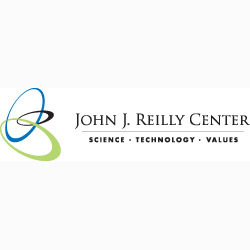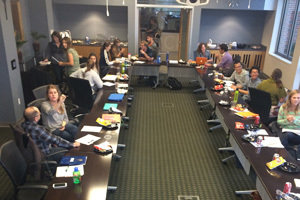

The John J. Reilly Center for Science, Technology, and Values has expanded its menu of training options for University of Notre Dame graduate students. Since August of 2013, three supplementary training and degree programs have been added and are open for graduate student enrollment. The new offerings advance understanding of the connections between science, technology, and society while broadening a traditional PhD or Master’s degree program of study.
“We’d like to get the word out about the transformation that’s taken place at Reilly over the past year,” said Reilly Director Anjan Chakravartty. “The Reilly Center is now home to the GLOBES Certificate in Environment and Society, we have a new History and Philosophy of Science minor, and we’re about to launch a National Science Foundation-funded training program in ethics and leadership. All three programs are open to graduate students interested in the societal impact of their research.”
Director Katherine Brading has served four years at the helm of the interdepartmental History and Philosophy of Science (HPS) program. She helped conceive the new HPS minor program approved by the Graduate School in the Spring of 2014. “We welcome students who seek new ways of looking at and thinking about their subject matter,” said Brading. “The HPS community is very close-knit. It’s a place where students can find inspiration from one another and bring out the best in each other.” The HPS minor targets students looking to deepen their understanding of the historical, philosophical, social, and political contexts of science and technology in societies past and present.

The GLOBES Graduate Certificate Program in Environment and Society moved to its new home in the Reilly Center in August of 2013. The certificate program under the directorship of associate professor of biology Jessica Hellmann, promotes interdisciplinary scholarship in environmental studies and professional development training in communication and public engagement skills. “Our mission at GLOBES is to prepare students to enter the 21st century workforce ready to make a difference at careers in and outside of academia,” said Hellmann. “The GLOBES credential certifies a student’s ability to work effectively in interdisciplinary settings and to offer the world innovative strategies for solving complex environmental challenges.”
Newest to the menu is the Reilly Center’s Social Responsibilities of Researchers (SRR) training program in ethics and leadership. The SRR program will announce the process for applications in January of 2015. Professor of Philosophy and former Director of the Reilly Center Don Howard is the principal investigator of the National Science Foundation (NSF) grant supporting the program. SRR training is designed to produce researchers and leaders in science and engineering fields who consider the ethical aspects and broader social impacts of their work. “I fully expect our SRR graduates to be capable of shaping and contributing to the nation’s agenda on science and technology,” said Howard. “We aim to produce young scientists and engineers who understand the impact of their work on the larger world. They will lead by example in putting their technical skills to work on behalf of promoting the common good.”
Established in 1985, the John J. Reilly Center for Science, Technology, and Values explores conceptual, ethical, and policy issues where science and technology intersect with society from different disciplinary perspectives. The Center supports a number of education, research, and outreach programs that advance adherence to ethical norms and the development of sound policy for the common good.
For more information on the Reilly Center and its graduate education programs, please see the website at reilly.nd.edu.